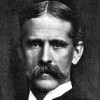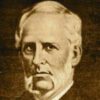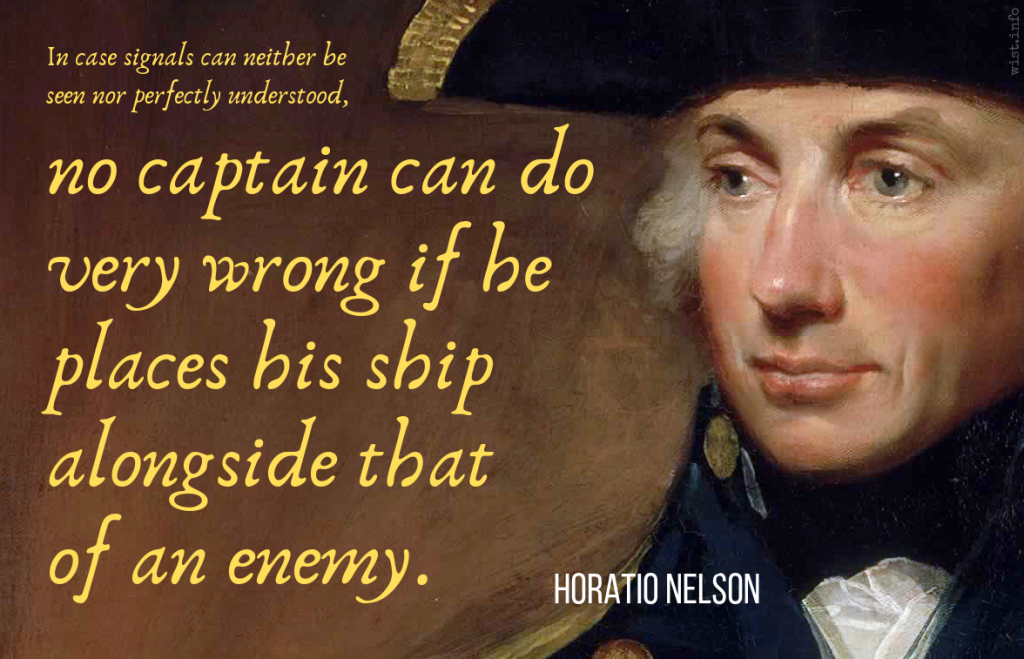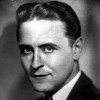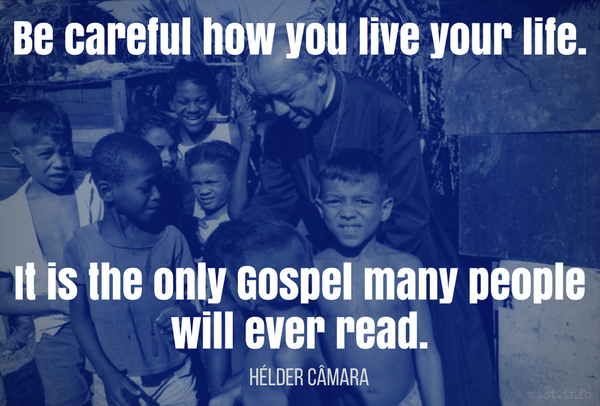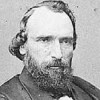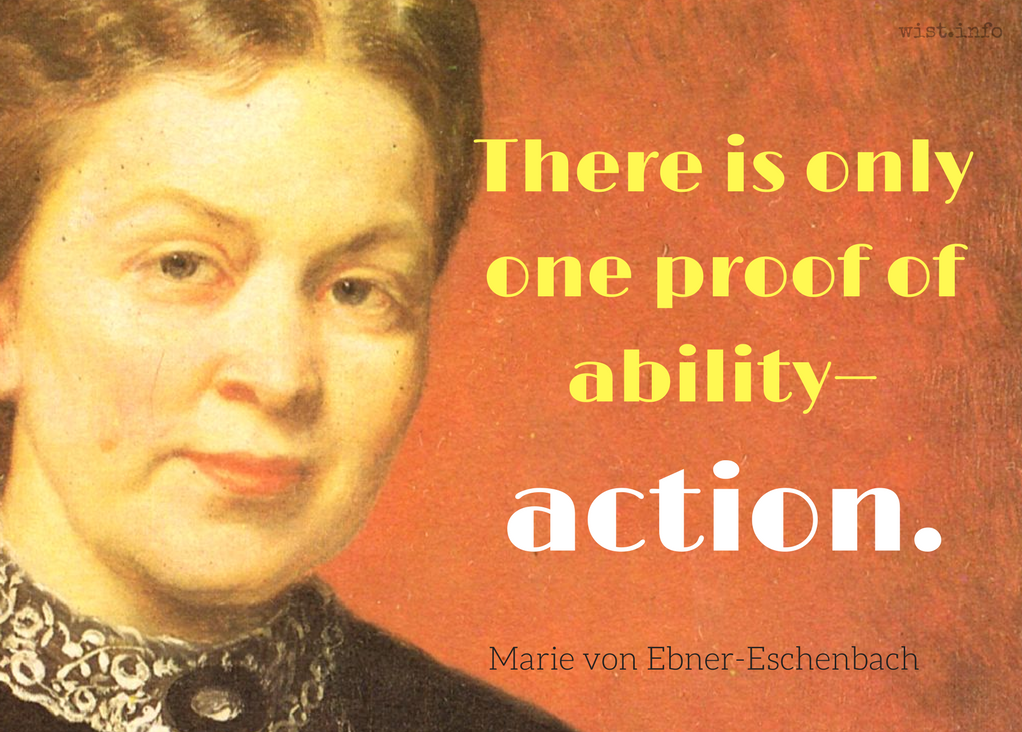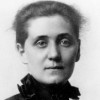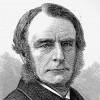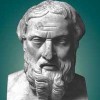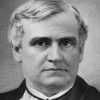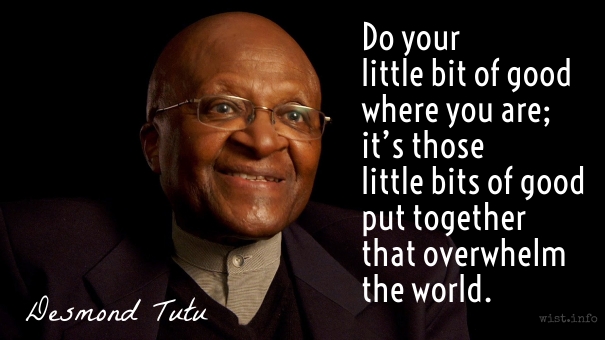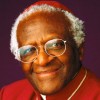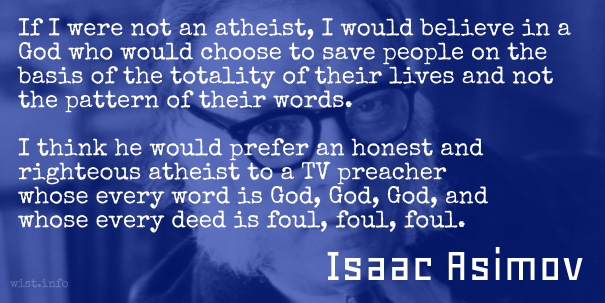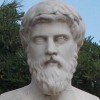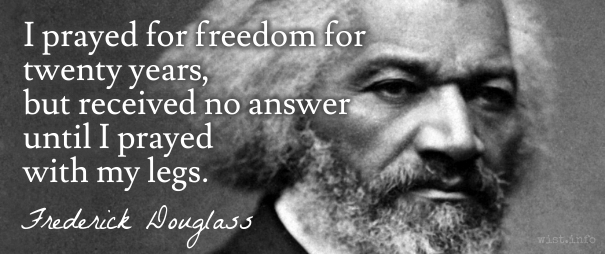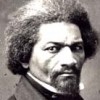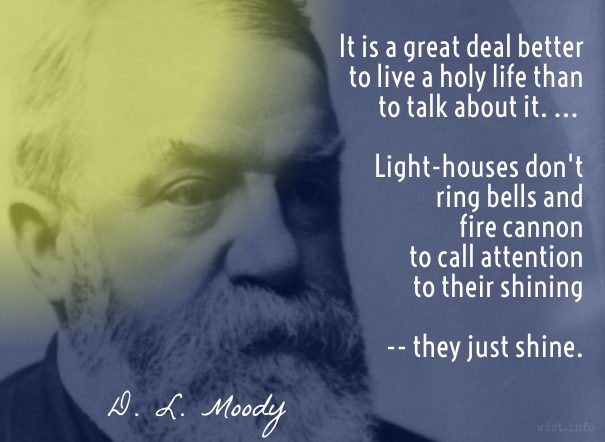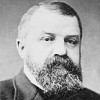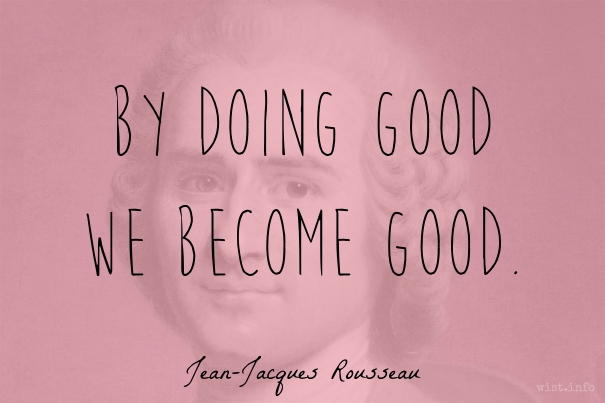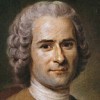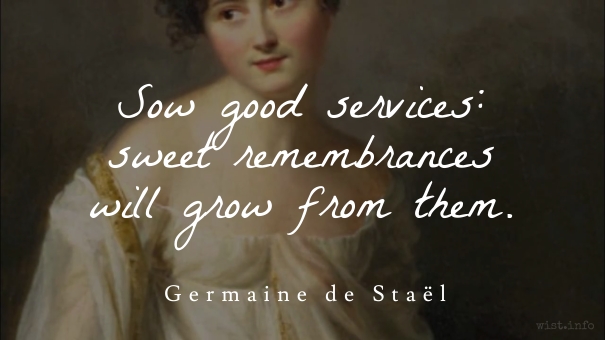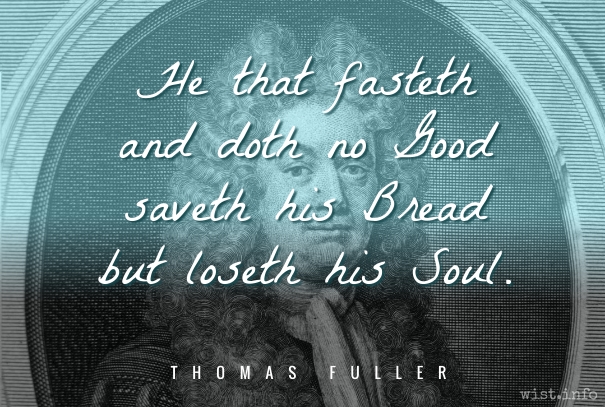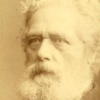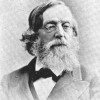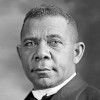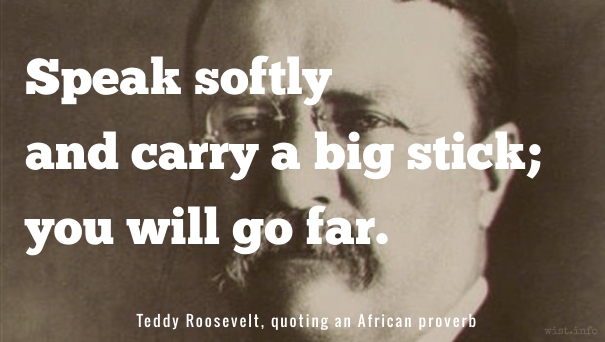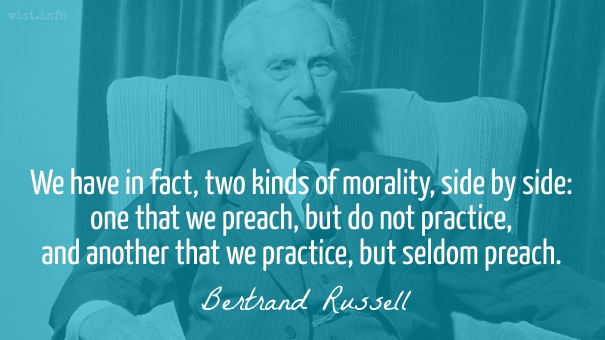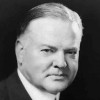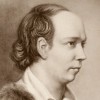DON LOUIS: No, no, birth is nothing where virtue is not. […] Know that a man of noble birth who leads an evil life is a monster in nature; virtue is the prime title of nobility; I care much less for the name a man signs than for the deeds he does; and I should feel more esteem for the son of a porter who was a true man, than for the son of a king who lived as you do.
[Non, non, la naissance n’est rien où la vertu n’est pas. […] Apprenez enfin qu’un gentilhomme qui vit mal est un monstre dans la nature ; que la vertu est le premier titre de noblesse ; que je regarde bien moins au nom qu’on signe, qu’aux actions qu’on fait, et que je ferais plus d’état du fils d’un crocheteur, qui serait honnête homme, que du fils d’un monarque qui vivrait comme vous.]
Molière (1622-1673) French playwright, actor [stage name for Jean-Baptiste Poquelin]
Don Juan [Dom Juan], Act 4, sc. 6 (1665) [tr. Page (1908)]
(Source)
Don Louis (Don Luis) speaking to his son, Don Juan.
(Source (French)). Other translations:No, no; Birth is nothing, where there's no Virtue. [...] Know, in short, that a Gentleman who lives ill, is a Monster in nature, that Virtue is the prime Title to Nobility, that I look much less upon the Name we subscribe, than the Actions that we perform, and that I shou'd value more being the Son of a Porter, who was an honest Man, than the Son of a Monarch who liv'd as you do.
[tr. Clitandre (1672)]No, no! Rank is nothing without virtue. [...] Know, finally, that a nobleman who leads a wicked life is a monster in nature; that virtue is the prime badge of nobility; that I regard much less the name which a man bears than the actions which he commits, and that I should value more highly a porter's son who was an honest man, than a monarch's son who led such a life as yours.
[tr. Van Laun (1876)]No, no; birth is nothing where virtue is not. [...] Know that a man of noble blood who leads a bad life is a monster in nature, and that virtue is the first title to nobility. I look less to the name that is signed, than to the actions; and I should be more proud of being the son of an honest porter than that of a monarch who lived your life.
[tr. Wall (1879)]No, no; where virtue is wanting birth does not signify anything. [...] Know, indeed, that a man of noble blood who leads a bad life is an unnatural monster; that virtue is the chief title to nobility; that I regard far less the name which one signs than the actions which one performs; and that I would rather be the son of a porter and honest than the son of a monarch and like you.
[tr. Waller (1904)]No, no, birth means nothing without virtue. [...] A nobleman who lives by evil is a natural monster. The first title to nobility is rectitude. For me the name a man signs counts for much less than the actions he performs, and I esteem a farm-laborer's honest son more highly than a king's son who lives as you do.
[tr. Bermel (1987)]
Quotations about:
deeds
Note not all quotations have been tagged, so Search may find additional quotes on this topic.
Do what you love. Know your own bone; gnaw at it, bury it, unearth it, and gnaw it still. Do not be too moral. You may cheat yourself out of much life so. Aim above morality. Be not simply good, be good for something.
Henry David Thoreau (1817-1862) American philosopher and writer
Letter (1848-03-27) to Harrison Blake
(Source)
Collected in F. B. Sanborn, ed., Familiar Letters (1865),
The fact is that in order to do any thing in this world worth doing, we must not stand shivering on the bank thinking of the cold and the danger, but jump in and scramble through as well as we can.
Sydney Smith (1771-1845) English clergyman, essayist, wit
Lecture (1804-1806), Moral Philosophy, No. 9 “On the Conduct of the Understanding,” Royal Institution, London
(Source)
Collected in Elementary Sketches of Moral Philosophy (1849).
I hope you’ll make mistakes. If you make mistakes, it means you’re out there doing something. And the mistakes in themselves can be very useful. I once misspelled Caroline, in a letter, transposing the As and the O, and I thought, “Coraline looks almost like a real name…”
Neil Gaiman (b. 1960) British author, screenwriter, fabulist
Speech (2012-05-17), Commencement, University of the Arts, Philadelphia [09:17]
(Source)
CLAUDIO: O, what men dare do! What men may do!
What men daily do, not knowing what they do!William Shakespeare (1564-1616) English dramatist and poet
Much Ado About Nothing, Act 4, sc. 1, l. 19ff (4.1.19-20) (1598)
(Source)
People who are too much concerned with little things usually become incapable of big ones.
[Ceux qui s’appliquent trop aux petites choses deviennent ordinairement incapables des grandes.]François VI, duc de La Rochefoucauld (1613-1680) French epigrammatist, memoirist, noble
Réflexions ou sentences et maximes morales [Reflections; or Sentences and Moral Maxims], ¶41 (1665-1678) [tr. Kronenberger (1959)]
(Source)
Present from the 1665 edition. See here for more discussion (English).
(Source (French)). Alternate translations:They that use to employ their minds too much upon Trifles, commonly make themselves incapable of any thing that is serious or great.
[tr. Stanhope (1694), ¶42]Those who apply themselves too much to little things, commonly become incapable of great ones.
[pub. Donaldson (1783), ¶38; ed. Lepoittevin-Lacroix (1797), ¶41]]Those who apply themselves much to little things, commonly become incapable of great ones.
[ed. Carville (1835), ¶35]Those who bestow too much application on trifling things, become generally incapable of great ones.
[ed. Gowens (1851), ¶42]Those who apply themselves too closely to little things often become incapable of great things.
[tr. Bund/Friswell (1871)]Undue attention to details tends to unfit us for greater enterprises.
[tr. Heard (1917)]Too close attention to trifles generally breeds incapacity in matters of moment.
[tr. Stevens (1939)]Men too involved in details usually become unable to deal with great matters.
[tr. FitzGibbon (1957)]People too much taken up with little things usually become incapable of big ones.
[tr. Tancock (1959)]Those who apply themselves too much to little things, ordinarily become incapable of great ones.
[tr. Whichello (2016)]
AHASUERAS: I am content.
ESTHER: Content is not the pathway to great deeds.
Ella Wheeler Wilcox (1850-1919) American author, poet, temperance advocate, spiritualist
Poem (1909), “The Drama of Mizpah: Honeymoon Scene,” Poems of Progress
(Source)
Fortune sumtimes shows us the way, but it iz energy that achieves sucksess.
[Fortune sometimes shows us the way, but it is energy that achieves success.]
Josh Billings (1818-1885) American humorist, aphorist [pseud. of Henry Wheeler Shaw]
Everybody’s Friend, Or; Josh Billing’s Encyclopedia and Proverbial Philosophy of Wit and Humor, ch. 131 “Affurisms: Plum Pits (1)” (1874)
(Source)
Every man’s last day is fixed.
Lifetimes are brief and not to be regained,
For all mankind. But by their deeds to make
Their fame last: that is labor for the brave.[Stat sua cuique dies, breve et inreparabile tempus
Omnibus est vitae; sed famam extendere factis,
Hoc virtutis opus.]Virgil (70-19 BC) Roman poet [b. Publius Vergilius Maro; also Vergil]
The Aeneid [Ænē̆is], Book 10, l. 467ff (10.467-69) [Jove] (29-19 BC) [tr. Fitzgerald (1981)]
(Source)
Jove, to Alcides (Hercules), comforting him on the pending, but brave, death of Pallas.
(Source (Latin)). Alternate translations:Each hath his fate; Short and irreparable time
Man's life enjoyes: But by brave deeds to clime
To honour's height, this they by valour gain.
[tr. Ogilby (1649)]Short bounds of life are set to mortal man.
'Tis virtue's work alone to stretch the narrow span.
[tr. Dryden (1697)]To every one his day is fixed: a short and irretrievable term of life is given to all: but by deeds to lengthen out fame, this is virtue's task.
[tr. Davidson/Buckley (1854)]Each has his destined time: a span
Is all the heritage of man:
'Tis virtue's part by deeds of praise
To lengthen fame through after days.
[tr. Conington (1866)]To every one his day
Stands fixed by fate. The term of mortal life
Is brief, and irretrievable to all.
But to extend the period of its fame
By noble actions, this is virtue's work.
[tr. Cranch (1872), l. 615ff]Each hath his own appointed day; short and irrecoverable is the span of life for all: but to spread renown by deeds is the task of valour.
[tr. Mackail (1885)]His own day bideth every man; short space that none may mend
Is each man's life: but yet by deeds wide-spreading fame to send,
Man's valour hath this work to do.
[tr. Morris (1900)]Each hath his day; irreparably brief
Is mortal life, and fading as the leaf.
'Tis valour's part to bid it bloom anew
By deeds of fame.
[tr. Taylor (1907), st. 63, l. 562ff]To each his day is given. Beyond recall
man's little time runs by: but to prolong
life's glory by great deeds is virtue's power.
[tr. Williams (1910)]Each has his day appointed; short and irretrievable is the span of life to all: but to lengthen fame by deeds -- that is valour's task.
[tr. Fairclough (1918)]Every man, my son,
Has his appointed time; life’s day is short
For all men; they can never win it back,
But to extend it further by noble deeds
Is the task set for valor.
[tr. Humphries (1951)]Every man's hour is appointed. Brief and unalterable
For all, the span of life. To enlarge his fame by great deeds
Is what the brave man must aim at.
[tr. Day-Lewis (1952)]Each has his day; there is, for all, a short,
irreparable time of life; the task
of courage: to prolong one's fame by acts.
[tr. Mandelbaum (1971), l. 648ff]Each man has his allotted day. All life is brief and time once past can never be restored. But the task of the brave man is to enlarge his fame by his actions.
[tr. West (1990)]Every man has his day, the course
of life is brief and cannot be recalled: but virtue’s task
is this, to increase fame by deeds.
[tr. Kline (2002)]Each man has his day, and the time of life
is brief for all, and never comes again.
But to lengthen out one’s fame with action,
that’s the work of courage.
[tr. Fagles (2006), l. 553ff]The day of death awaits all men; their time is brief and comes just once. But they can prolong their fame by action. This is the task of valor.
[tr. Bartsch (2021)]
KING: From lowest place when virtuous things proceed,
The place is dignified by the doer’s deed.William Shakespeare (1564-1616) English dramatist and poet
All’s Well That Ends Well, Act 2, sc. 3, l. 136ff (2.3.136-137) (1602?)
(Source)
‘A time may come soon,’ said he, ‘when none will return. Then there will be need of valour without renown, for none shall remember the deeds that are done in the last defence of your homes. Yet the deeds will not be less valiant because they are unpraised.’
J.R.R. Tolkien (1892-1973) English writer, fabulist, philologist, academic [John Ronald Reuel Tolkien]
The Lord of the Rings, Vol. 3: The Return of the King, Book 5, ch. 2 “The Passing of the Grey Company” [Aragorn to Éowyn] (1955)
(Source)
What we do belongs to what we are; and what we are is what becomes of us.
Acts and their consequences are the things by which our fellows judge us. Anything else, and all that you get is a cheap feeling of moral superiority by thinking how you would have done something nicer if it had been you. So as for the rest, leave it to heaven. I’m not qualified.
Don’t be a man of “Intentions.” The world gives a man credit only for his deeds and, often, not even for them.
Minna Antrim (1861-1950) American epigrammatist, writer
Don’ts for Bachelors and Old Maids (1908)
(Source)
Be both a speaker of words and a doer of deeds.
[Μύθων τε ῥητῆρ’ ἔμεναι πρηκτῆρά τε ἔργων.]
Homer (fl. 7th-8th C. BC) Greek author
The Iliad [Ἰλιάς], Book 9, l. 442 (9.442) (c. 750 BC) [tr. Leaf/Lang/Myers (1891)]
(Source)
Phoenix, on what he was sent to teach Achilles as a child to become. (Source (Greek)). Alternate translations:That thou might'st speak, when speech was fit, and do, when deeds were done,
Not sit as dumb, for want of words, idle, for skill to move.
[tr. Chapman (1611)]To shine in councils and in camps to dare.
[tr. Pope (1715-20)]Both elocution and address in arms.
[tr. Cowper (1791)]An orator in words and a performer in deeds.
[tr. Buckley (1860)]Be both a speaker of words and a doer of deeds.
[tr. Murray (1924)]A speaker of words and one accomplished in action.
[tr. Lattimore (1951)]A man of eloquence and action.
[tr. Fitzgerald (1974)]A man of words, and a man of action, too.
[tr. Fagles (1990), l. 538]To be both a speaker of words and a doer of actions.
[tr. Merrill (2007)]To be a speaker of words and a doer of deeds.
[tr. @Sentantiq (2016)]
One must not always think so much about what one should do, but rather what one should be. Our works do not ennoble us; but we must ennoble our works.
Meister Eckhart (c. 1260-1328?) German theologian, philosopher, mystic [a.k.a. Johannes Eckhart von Hochheim; Eckhart; Eckehart]
Work and Being (14th C.)
Note: I haven't found a text by that name in Eckhart's bibliography, nor this quotation anywhere connected with anything but that title or none at all.
True is, that whilome that good poet sayd,
The gentle minde by gentle deeds is knowne:
For a man by nothing is so well bewrayd,
As by his manners.Edmund Spenser (c. 1552-1599) English poet
The Faerie Queene, Book 6, Canto 3, st. 1 (1589-96)
(Source)
Spender is referencing Chaucer's "Wife of Bath's Tale" in the Canterbury Tales: "he is gentil that doth gentil dedis."
Do you believe?
Belief will not save you.
Only actions
Guided and shaped
By belief and knowledge
Will save you.
Belief
Initiates and guides action —
Or it does nothing.Octavia Butler (1947-2006) American writer
The Parable of the Talents, ch. 20, epigraph (1998)
(Source)
Right actions for the future are the best apologies for wrong ones in the past — the best evidence of regret for them that we can offer, or the world receive.
Tryon Edwards (1809-1894) American theologian, writer, lexicographer
A Dictionary of Thoughts (1908)
(Source)
Often wrongly quoted, "... best apologies for bad actions in the past."
In case signals can neither be seen nor perfectly understood, no captain can do very wrong if he places his ship alongside that of an enemy.
Horatio Nelson (1758-1805) British admiral
Memorandum before the Battle of Trafalgar (9 Oct 1805)
(Source)
Action is character.
F. Scott Fitzgerald (1896-1940) American writer [Francis Scott Key Fitzgerald]
“Notes for The Last Tycoon” (1941)
(Source)
Be careful how you live your life, it is the only Gospel many people will ever read.
Hélder Câmara (1909-1999) Brazilian Catholic Archbishop, social and political activist
(Attributed)
Quoted in 1985 in Basta, the national news letter of the Chicago Religious Task Force on Central America.
Alt. trans.: "Watch how you live. Your lives may be the only gospel your brothers and sisters will ever read."
Thought is sad without action, and action is sad without thought.
Henri-Frédéric Amiel (1821-1881) Swiss philosopher, poet, critic
Journal (2nd Ed.,1889)
(Source)
Quoted in Cesare Lombroso, The Man of Genius (1896),
There is only one proof of ability — action.
[Für das Können gibt es nur einen Beweis: das Tun.]
Marie von Ebner-Eschenbach (1830-1916) Austrian writer
Aphorisms [Aphorismen], No. 91 (1880) [tr. Wister (1883)]
(Source)
(Source (German)). Alternate translation:There is only one proof of ability: doing it.
[tr. Scrase/Mieder (1994)]
For action is indeed the sole medium of expression for ethics. We continually forget that the sphere of morals is the sphere of action, that speculation in regard to morality is but observation and must remain in the sphere of intellectual comment, that a situation does not really become moral until we are confronted with the question of what shall be done in a concrete case, and are obliged to act upon our theory.
Jane Addams (1860-1935) American reformer, suffragist, philosopher, author
Democracy and Social Ethics, ch. 7 “Political Reform” (1902)
(Source)
Do not fancy, as too many do, that thou canst praise God by singing hymns to Him in church once a week, and disobeying Him all the week long. … Dost thou fancy as the heathen do, that God needs to be flattered with fine words? or that thou wilt be heard for thy much speaking, and thy vain repetitions? He asks of thee works as well as words; and more, He asks of thee works first and words after.
Charles Kingsley (1819-1875) English clergyman, historian, essayist, novelist (pseud. "Parson Lot")
The Good News of God, Sermon 4 “The Song of the Three Children (Daniel 3:16-18)” (1881)
(Source)
Duty makes us do things well, but love makes us do them beautifully.
Phillips Brooks (1835-1893) American clergyman, hymnist
(Attributed)
(Source)
Quoted in Life and Light for Woman, Vol. 26, #1 (Jan 1896)
Our acts make or mar us, we are the children of our own deeds.
Victor Hugo (1802-1885) French writer
(Attributed)
Not confirmed or found in Hugo's writings.
The most common citation is is used in Henry Southgate, Things A Lady Would Like To Know, "November 18," epigraph (1875). However, I found a number of earlier references:A similar quotation, attributed (similarly without citation) to Miguel de Cervantes or Jean Paul Richter, reads: "Good actions ennoble us, and we are sons of our own deeds."
- 1874: Eugene Crowell, The Identity of Primitive Christianity and Modern Spiritualism (no attribution to Hugo).
- 1873: Maria Westmoreland, Clifford Troup: A Georgia Story, ch. 23.
- 1872-05-09: Massillon Independent, Vol. 9, No. 49 (column filler, no attribution to Hugo).
- 1872: Maturin Ballou, Treasury of Thought.
The wish falls often warm upon my heart that I may learn nothing here that I cannot continue in the other world; that I may do nothing here but deeds that will bear fruit in heaven.
Jean Paul Richter (1763-1825) German writer, art historian, philosopher, littérateur [Johann Paul Friedrich Richter; pseud. Jean Paul]
Letter to Rector Werner (1781)
(Source)
Do your little bit of good where you are; it’s those little bits of good put together that overwhelm the world.
If I were not an atheist, I would believe in a God who would choose to save people on the basis of the totality of their lives and not the pattern of their words. I think he would prefer an honest and righteous atheist to a TV preacher whose every word is God, God, God, and whose every deed is foul, foul, foul.
I prayed for freedom for twenty years, but received no answer until I prayed with my legs.
ANTONY: The evil men do lives after them;
The good is oft interred with their bones.William Shakespeare (1564-1616) English dramatist and poet
Julius Caesar, Act 3, sc. 2, l. 84ff (3.2.84-85) (1599)
(Source)
It is a great deal better to live a holy life than to talk about it. We are told to let our light shine, and if it does, we won’t need to tell anybody it does. Light-houses don’t ring bells and fire cannon to call attention to their shining — they just shine.
You don’t become great by trying to be great. You become great by wanting to do something, then doing it so hard that you become great in the process.
Randall Munroe (b. 1984) American webcomic writer, roboticist, programmer
XKCD, # 896 “Marie Curie” (9 May 2011)
(Source)
Sow good services: sweet remembrances will grow from them.
He who fasteth and doth no Good, saveth his Bread but loseth his Soul.
Thomas Fuller (1654-1734) English physician, preacher, aphorist, writer
Gnomologia: Adages and Proverbs (compiler), # 2382 (1732)
(Source)
You never can tell when you do an act
Just what the result will be;
But with every deed you are sowing a seed,
Though the harvest you may not see.Ella Wheeler Wilcox (1850-1919) American author, poet, temperance advocate, spiritualist
Poem (1896), “You Never Can Tell,” ll. 9-12, Custer And Other Poems
(Source)
If you really want to judge the character of a man, look not at his great performances. Every fool may become a hero at one time or another. Watch a man do his most common actions; these are indeed the things which will tell you the real character of a great man.
Every good act is charity. A man’s true wealth hereafter is the good that he does in this world to his fellows.
Muhammad (AD c. 570-632) Arab religious, military, and political leader; founder of Islam [Mohammed, مُحَمَّد]
(Attributed)
(Source)
Attributed in Rev. James Wood (ed.) Dictionary of Quotations from Ancient and Modern, English and Foreign Sources (1893). Also sometimes attributed to Moliere.
It is easier to write ten volumes of philosophy than to put one principle into practice.
Leo Tolstoy (1828-1910) Russian novelist and moral philosopher
Diary (1847-03-17)
(Source)
From his earliest diary entry, when he was 18.Variants:
- "It is easier to produce ten volumes of philosophical writing than to put one principle into practice."
- "It is easier to write ten volumes on theoretical principles than to put one principle into practice."
I doubt that anyone does not really believe in God. People may think they don’t have any belief, but you will usually find that there is a belief in something beyond himself. In any case, I would not judge a man’s character by his belief or unbelief. I would judge his character by his deeds; and no matter what he said about his beliefs, his behavior would soon show whether he was a man of good character or bad.
Neither praise, nor dispraise thy self; thy Actions will do it enough.
Thomas Fuller (1654-1734) English physician, preacher, aphorist, writer
Introductio ad Prudentiam, Vol. 1, # 338 (1725)
(Source)
The only things in which we can be said to have any property are our actions. Our thoughts may be bad, yet produce no poison; they may be good, yet produce no fruit. Our riches may be taken away from us by misfortune, our reputation by malice, our spirits by calamity, our health by disease, our friends by death. But our actions must follow us beyond the grave; with respect to them alone, we can not say that we shall carry nothing with us when we die, neither that we shall go naked out of the world.
Charles Caleb "C. C." Colton (1780-1832) English cleric, writer, aphorist
Lacon: Or, Many Things in Few Words, Vol. 1, § 52 (1820)
(Source)
Waste no more time arguing what a good man should be. Be one.
[Μηκέθ̓ ὅλως περὶ τοῦ οἷόν τινα εἶναι τὸν ἀγαθὸν ἄνδρα διαλέγεσθαι, ἀλλὰ εἶναι τοιοῦτον.]
Marcus Aurelius (AD 121-180) Roman emperor (161-180), Stoic philosopher
Meditations [To Himself; Τὰ εἰς ἑαυτόν], Book 10, ch. 16 (10.16) (AD 161-180) [tr. Staniforth (1964)]
(Source)
(Source (Greek)). Alternate translations:Make it not any longer a matter of dispute or discourse, what are the signs and proprieties of a good man, but really and actually to be such.
[tr. Casaubon (1634), 10.18]Notion without Practice is Impertinence; spend no more time then in stating the Qualifications of a Man of Virtue, but endeavour to get them.
[tr. Collier (1701)]Spend your time no longer, in discoursing on what are the qualities of the good-man; but in actually being such.
[tr. Hutcheson/Moor (1742)]Lose no more time in disputing about the definition of a good man, but endeavour yourself to be one.
[tr. Graves (1792)]No longer talk at all about the kind of man that a good man ought to be, but be such.
[tr. Long (1862)]Spend no more time in stating the qualifications of a man of virtue, but endeavour to get them.
[tr. Collier/Zimmern (1887)]No more mere talk of what the good man should be. Be it!
[tr. Rendall (1898)]Discourse no more of what a good man should be; but be one.
[tr. Hutcheson/Chrystal (1902)]Put an end once for all to this discussion of what a good man should be, and be one.
[tr. Haines (Loeb) (1916)]Don't any more discuss at large what the good man is like, but be good.
[tr. Farquharson (1944)]No more of all this talk about what a good man should be, but simply be one!
[tr. Hard (1997 ed.)]To stop talking about what the good man is like, and just be one.
[tr. Hays (2003)]No more roundabout discussion of what makes a good man. Be one!
[tr. Hammond (2006)]Stop philosophizing about what a good man is and be one.
[tr. Needleman/Piazza (2008)]No more of all this talk about what a good man should be, but simply be one!
[tr. Hard (2011 ed.)]
There is a fire-fly in the southern clime
Which shineth only when upon the wing;
So it is with the mind: when once we rest,
We darken.Philip James Bailey (1816-1902) English poet, lawyer
Festus, Sc. “A Village Feast – Evening” [Festus] (1839)
(Source)
Usually paraphrased (earliest source (1872)):The firefly only shines when on the wing.
So is it with the mind -- when once we rest
We darken.
A little mind is always hurried, by twenty things at once; but a man of sense does but one thing at a time, and resolves to excel in it; for whatever is worth doing at all is worth doing well.
Lord Chesterfield (1694-1773) English statesman, wit [Philip Dormer Stanhope]
Letter to his son, #71 (10 Mar 1746)
(Source)
Next to doing things that deserve to be written, there is nothing that gets a man more credit, or gives him more pleasure, than to write things that deserve to be read.
Lord Chesterfield (1694-1773) English statesman, wit [Philip Dormer Stanhope]
Letter to his son, #44 (1740?)
(Source)
We must be something in order to do something, but we must also do something in order to be something. The best rule, I think, is this: If we find it hard to do good, then let us try to be good. If, on the other hand, we find it hard to be good, then let us try to do good. Being leads to doing, doing leads to being. Yet below both as their common root is faith, — faith in God, in man, in ourselves, in the eternal superiority of right over wrong, truth over error, good over evil, love over all selfishness and all sin.
Do not let your deeds belie your words, lest when you speak in church someone may say to himself, “Why do you not practice what you preach?”
Jerome of Stridon (c. 347-420) Roman Christian priest, theologian, historian, translator, Doctor of the Church [Saint Jerome, Eusebius Sophronius Hieronymus, Εὐσέβιος Σωφρόνιος Ἱερώνυμος]
Letter 52, to Nepotian (AD 394)
Alt. trans.: "Do not let your deeds belie your words; lest when you speak in church someone may mentally reply, 'Why do you not practice what you profess?'" [Philip Schaff & Henry Wace (eds.) A Select Library of Nicene and Post-Nicene Fathers of the Christian Church, vol. 6 (1893)]
Good impulses are naught, unless they become good actions.
[Les bons mouvements ne sont rien, s’ils ne deviennent de bonnes actions.]Joseph Joubert (1754-1824) French moralist, philosopher, essayist, poet
Pensées [Thoughts], ch. 5 “Des Passions et des Affections de l’Âme [On the Soul],” ¶ 75 (1850 ed.) [tr. Calvert (1866)]
(Source)
The world cares very little about what a man or woman knows; it is what the man or woman is able to do that the world cares about.
Booker T. Washington (1856-1915) American educator, writer
“Mind and Matter,” Speech, Alabama State Teachers’ Association, Selma (5 Jun 1895)
Washington reused material in various speeches he gave. In an address to the African Methodist Episcopal Zion Church, Boston (30 July 1903), he phrased this: "The world cares very little what you or I know, but it does care a great deal about what you or I do."
This world, where much is to be done and little to be known.
Samuel Johnson (1709-1784) English writer, lexicographer, critic
Prayers and Meditations, 1784-08-12, “Against Inquisitive and Perplexing Thoughts (1785)
(Source)
I propose good fellowship — good friends all around. No matter what we believe, shake hands and let it go. That is your opinion; this is mine: let us be friends. Science makes friends; religion, superstition, makes enemies. They say: Belief is important. I say: No, actions are important. Judge by deed, not by creed. Good fellowship — good friends — sincere men and women — mutual forbearance, born of mutual respect.
Robert Green Ingersoll (1833-1899) American lawyer, freethinker, orator
“What Must We Do To Be Saved?” sec. 11 (1880)
(Source)
Give me but virtuous actions, and I will not quibble and chicane about the motives.
Lord Chesterfield (1694-1773) English statesman, wit [Philip Dormer Stanhope]
Letter to his son, #161 (5 Sep 1748)
(Source)
I have always been fond of the West African proverb “Speak softly and carry a big stick; you will go far.”
Theodore Roosevelt (1858–1919) American politician, statesman, conservationist, writer, US President (1901–1909)
Letter (1900-01-26) to Henry L. Sprague
(Source)
The letter to Sprague is is the first known use by Roosevelt of his future catch phrase. It attained more fame when he used it in a speech at the Minnesota State Fair (1901-09-02) (two versions found):There is a homely adage which runs "Speak softly and carry a big stick; you will go far." If the American nation will speak softly and yet build and keep at a pitch of highest training a thoroughly efficient Navy, the Monroe Doctrine will go far.
[Speech (1901-09-02), "A Nation of Pioneers," Minnesota State Fair, Minneapolis]A good many of you are probably acquainted with the old proverb "Speak softly and carry a big stick -- you will go far."
[Minneapolis Tribune (1901-09-03)]
Other significant references:Right here let me make as vigorous a plea as I know how in favor of saying nothing that we do not mean, and of acting without hesitation up to whatever we say. A good many of you are probably acquainted with the old proverb, 'Speak softly and carry a big stick -- you will go far.' If a man continually blusters, if he lacks civility, a big stick will not save him from trouble, and neither will speaking softly avail, if back of the softness there does not lie strength, power.
[Speech (1903-04-02), Chicago]One the main lessons to learn from this war is embodied in the homely proverb: "Speak softly and carry a big stick."
[America and the World War, ch. 2 "The Belgian Tragedy" (1915)]The only safe rule [in foreign policy] is to promise little, and faithfully keep to every promise; to "speak softly and carry a big stick."
[Theodore Roosevelt: An Autobiography, ch. 15 "The Peace of Righteousness" (1913)]
More discussion here:
“What do you fear, lady?” he asked.
“A cage,” she said. “To stay behind bars, until use and old age accept them, and all chance of doing great deeds is gone beyond recall or desire.”J.R.R. Tolkien (1892-1973) English writer, fabulist, philologist, academic [John Ronald Reuel Tolkien]
The Lord of the Rings, Vol. 3: The Return of the King, Book 5, ch. 2 “The Passing of the Grey Company” [Aragorn and Eowyn] (1955)
(Source)
The thoughts they had were the parents of the actions they did; their feelings were the parents of their thoughts.
Thomas Carlyle (1795-1881) Scottish essayist and historian
Lecture (1840-05-05), “The Hero as Divinity,” Home House, Portman Square, London
(Source)
The lecture notes were collected by Carlyle into On Heroes, Hero-Worship, & the Heroic in History, Lecture 1 (1841).
If you wou’d not be forgotten
As soon as you are dead and rotten,
Either write things worth reading,
Or do things worth the writing.Benjamin Franklin (1706-1790) American statesman, scientist, philosopher, aphorist
Poor Richard (1738 ed.)
(Source)
Every noble work is at first impossible. In very truth, for every noble work the possibilities will lie diffused through Immensity; inarticulate, undiscoverable except to faith.
Thomas Carlyle (1795-1881) Scottish essayist and historian
Past and Present, Book 3, ch. 11 “Labour” (1843)
(Source)
Only actions give life strength; only moderation gives it a charm.
[Nur Taten geben dem Leben Stärke, nur Maß ihm Reiz.]
Jean Paul Richter (1763-1825) German writer, art historian, philosopher, littérateur [Johann Paul Friedrich Richter; pseud. Jean Paul]
Titan, Jubilee 35, cycle 145 (1803) [tr. Brooks (1863)]
(Source)
Often only the first part is given as a quotation (or even just as a "German proverb").
(Source (German)). Alternate translations:Only deeds give strength to life, and only measure gives it charm.
[Source (1858)]Only deeds give strength to life, only moderation gives it charm.
[Source (1896)]
Actually, we who engage in nonviolent direct action are not the creators of tension. We merely bring to the surface the hidden tension that is already alive. We bring it out in the open, where it can be seen and dealt with. Like a boil that can never be cured so long as it is covered up but must be opened with all its ugliness to the natural medicines of air and light, injustice must be exposed, with all the tension its exposure creates, to the light of human conscience and the air of national opinion before it can be cured.
Martin Luther King, Jr. (1929-1968) American clergyman, civil rights leader, social activist, preacher
Letter from Birmingham Jail (16 Apr 1963)
(Source)
There are large parts of the Christian ethic which are universally admitted to be too good for this wicked world. We have in fact, two kinds of morality, side by side: one that we preach, but do not practice, and another that we practice, but seldom preach.
ULYSSES: Those scraps are good deeds past, which are devoured
As fast as they are made, forgot as soon
As done. Perseverance, dear my lord,
Keeps honor bright. To have done is to hang
Quite out of fashion like a rusty mail
In monumental mock’ry.William Shakespeare (1564-1616) English dramatist and poet
Troilus and Cressida, Act 3, sc. 3, l. 153ff (3.3.153-158) (1602)
(Source)
It is the greatest of all mistakes to do nothing because you can only do little. Do what you can.
Sydney Smith (1771-1845) English clergyman, essayist, wit
Lecture (1804-1806), Moral Philosophy, No. 19 “On the Conduct of the Understanding, Part 2” Royal Institution, London
(Source)
Collected in Elementary Sketches of Moral Philosophy (1849).
I have ever thought religion a concern purely between our god and our consciences, for which we were accountable to him, and not to the priests. I never told my own religion, nor scrutinised that of another. I never attempted to make a convert, nor wished to change another’s creed. I have ever judged of the religion of others by their lives: and by this test, my dear Madam, I have been satisfied yours must be an excellent one, to have produced a life of such exemplary virtue and correctness. For it is in our lives, and not from our words, that our religion must be read. By the same test the world must judge me.
Thomas Jefferson (1743-1826) American political philosopher, polymath, statesman, US President (1801-09)
Letter (1816-08-06) to Margaret Bayard Smith
(Source)
When people come to see us, we foolishly prattle, lest we be inhospitable. But things said for conversation are chalk eggs. Don’t say things. What you are stands over you the while, and thunders so that I cannot hear what you say to the contrary.
Ralph Waldo Emerson (1803-1882) American essayist, lecturer, poet
“Social Aims,” lecture, Boston (1864-12-04), Letters and Social Aims (1875)
(Source)
Likely source of the abridgments more commonly found *in:More discussion of this quotation: What You Do Speaks So Loudly that I Cannot Hear What You Say – Quote Investigator
- "What you do speaks so loudly that I cannot hear what you say."
- "What you are speaks so loudly that I cannot hear what you say."
- "Who you are speaks so loudly that I cannot hear what you say."
- "What we are speaks louder than what we say." [John F Kennedy, Q&A, Salt Lake City (23 Sep 1960), and in numerous subsequent speeches]
Children have more need of models than of critics.
[Les enfants ont plus besoin de modèles que de critiques.]
Joseph Joubert (1754-1824) French moralist, philosopher, essayist, poet
Pensées [Thoughts], ch. 19 “De l’Éducation [On Education],” ¶ 3 (1850 ed.) [tr. Calvert (1866), ch. 14]
(Source)
Sometimes attributed to Carolyn Coats.
(Source (French)). Alternate translations:Children have more need of models than of critics.
[tr. Attwell (1896), ¶ 261]Children need models rather than critics.
[tr. Lyttelton (1899), ch. 18, ¶ 1]Children. Need models more than critics.
[tr. Auster (1983), 1800 entry]
I long to accomplish a great and noble task; but it is my chief duty and joy to accomplish humble tasks as though they were great and noble. It is my service to think how I can best fulfil the demands that each day makes upon me, and to rejoice that others can do what I cannot. Green, the historian, tells us that the world is moved along, not only by the mighty shoves of its heroes, but also by the aggregate of the tiny pushes of each honest worker, and that thought alone suffices to guide me in this dark world and wide. I love the good that others do; for their activity is an assurance that whether I can help or not, the true and the good will stand sure.
Helen Keller (1880-1968) American author and lecturer
“Optimism,” Part 1 (1903)
(Source)
Often paraphrased as: "I long to accomplish a great and noble task, but it is my chief duty to accomplish humble tasks as though they were great and noble. The world is moved along, not only by the mighty shoves of its heroes, but also by the aggregate of the tiny pushes of each honest worker."
VOLUMNIA: Action is eloquence.
William Shakespeare (1564-1616) English dramatist and poet
Coriolanus, Act 3, sc. 2, l. 95 (3.2.95) (c. 1608)
(Source)
It is from the numberless diverse acts of courage and belief that human history is shaped. Each time a man (or a woman) stands up for an ideal, or acts to improve the lot of others, or strikes out against injustice, he (or she) sends a tiny ripple of hope, and crossing each other from a million different centers of energy and daring, those ripples build a current which can sweep down the mightiest walls of oppression and resistance.
Robert Francis Kennedy (1925-1968) American politician
“Day of Affirmation,” address, University of Capetown, South Africa (6 Jun 1966)
(Source)
Inscribed on the RFK gravesite at Arlington National Cemetery as "It is from numberless diverse acts of courage and belief that human history is shaped. Each time a man stands up for an ideal, or acts to improve the lot of others, or strikes out against injustice, he sends forth a tiny ripple of hope, and crossing each other from a million different centers of energy and daring those ripples build a current which can sweep down the mightiest walls of oppression and injustice."
Ours is a practical people, to whom ideals furnish the theory of political action, upon which they want not only firm assurance, but also effective practice. They want programmes, but they want action to flow from them. They want constructive common sense. They want the development of the common will, not the views of a single individual. They are beginning to realize that words without action are the assassins of idealism.
We live in deeds, not years:
In thoughts, not breaths;
In feelings, not in figures on a dial.
We should count time by heart-throbs.
He most lives
Who thinks most, feels the noblest, acts the best.Philip James Bailey (1816-1902) English poet, lawyer
Festus, Sc. “A Country Town – Market-place – Noon” [Festus] (1839)
(Source)
Often misattributed to Aristotle.
After all, when the day of judgement comes we shall be examined about what we have done, not about what we have read; whether we have lived conscientiously, not whether we have turned fine phrases.
[Certe adveniente die judicii, non quæretur a nobis quid legimus, sed quid fecimus; nec quam bene diximus, sed quam religiose viximus.]
Thomas à Kempis (c. 1380-1471) German-Dutch priest, author
The Imitation of Christ [De Imitatione Christi], Book 1, ch. 3, v. 5 (1.3.5) (c. 1418-27) [tr. Knox-Oakley (1959)]
(Source)
(Source (Latin)). Alternate translations:At the day of judgment it shall not be asked of us what we have read, but what we have done: nor how well we have said, but how religiously we have lived.
[tr. Whitford/Raynal (1530/1871)]On the day of judgment we will not be asked what we have read, but what we have done; not how well we have discoursed, but how religiously we have lived.
[tr. Whitford/Gardiner (1530/1955)]Assuredly at the day of judgment we shall not be examined how many bookes we have read, but how many good workes we have done; not how rhetorically we have spoken, but how religiously we have lived.
[tr. Page (1639), 1.3.22]A Day of Judgment there will come, where in Measures will be taken very different form ours; when the Enquiry, upon which our Affairs must all turn, will be, not how much we have Heard or Read, but how much we have done; not how Eloquent our Expressions, but how Pure and Devout our Lives; how much our Manners, not our Capacity or Breeding, our Wit or Rhetorick, distinguished us from common Men.
[tr. Stanhope (1696; 1706 ed.)]Assuredly, in the approaching day of universal judgment, it will not be enquired what we have read, but what we have done; not how eloquently we have spoken, but how holily we have lived.
[tr. Payne (1803)]Truly, at the day of judgment we shall not be examined what we have read, but what we have done; not how well we have spoken, but how religiously we have lived.
[ed. Parker (1841)]Assuredly, in the approaching day of judgment, it will not be inquired of us what we have read, but what we have done; not how eloquently we have spoken, but how holily we have lived.
[tr. Dibdin (1851)]Verily, when the day of judgment comes, we shall not be asked what we have read, but what we have done; nor how well we have spoken, but how religiously we have lived.
[ed. Bagster (1860)]Of a surety, at the Day of Judgment it will be demanded of us, not what we have read, but what we have done; not how well we have spoken, but how holily we have lived.
[tr. Benham (1874)]Truly, at the day of judgment we shall not be examined as to what we have read, but as to what we have done; not as to how well we have spoken, but as to how religiously we have lived.
[tr. Anon. (1901)]On the day of judgment, surely, we shall not be asked what we have read but what we have done; not how well we have spoken but how well we have lived.
[tr. Croft/Bolton (1940)]Surely on coming to the day of judgment we shall not be asked what we have read but what we have done: not how well we talked but how religiously we lived.
[tr. Daplyn (1952)]At the Day of Judgement, we shall not be asked what we have read, but what we have done; not how eloquently we have spoken, but how holily we have lived.
[tr. Sherley-Price (1952)]When the day of judgment comes, we shall not be asked what we have read, but what we have done, not if we made fine speeches, but if we lived religious lives.
[tr. Knott (1962)]When the day of judgement comes we will be asked not what books we read, but what deeds we did, not how well we spoke, but how religiously we lived.
[tr. Rooney (1979)]Surely, when the day of judgment comes we shall not be asked what we have read but what we have done, not how well we have spoken but how devoutly we have lived.
[tr. Creasy (1989)]
It is not the critic who counts, nor the man who points out how the strong stumbled or where the doer of the deed could have done better. The credit belongs to the man who is actually in the arena; whose face is marred by dust and sweat and blood; who strives valiantly; who errs and comes up short again and again. Who knows the great enthusiasms, the great devotions, and spends himself in a worthy cause; who at the best knows in the end the triumphs of high achievement; and who at the worst, if he fails, at least fails while daring greatly; so that his place shall never be with those cold and timid souls who know neither victory or defeat.
Theodore Roosevelt (1858–1919) American politician, statesman, conservationist, writer, US President (1901–1909)
Speech (1910-04-23), “Citizenship in a Republic [The Man in the Arena],” Sorbonne, Paris
(Source)











